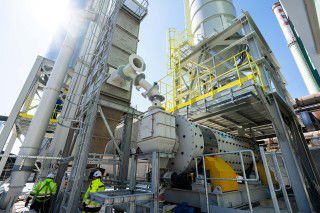Holcim Group agreed to sell its Indian cement businesses this week for US$10.5bn in cash to the Adani Group. ICR reports on the deal and what this means for the Indian cement sector and Holcim going forward.
The Adani Group is a coal, power, ports and renewable energy conglomerate that had only a small footprint (Adani Enterprises Ltd) in the cement sector before its interest in Holcim companies, ACC Ltd and Ambuja Cements. The latest acquisition will make Adani the second-largest player in the Indian cement market controlling 70Mta of cement capacity, behind Aditya Birla's UltraTech Cement (see Table 1). Adani Group will acquire a 63.2 per cent stake in Ambuja Cement and 54.5 per cent in ACC Ltd. Holcim reports that Adani's offer out bid the US$7m of JSW Cement and is valued at INR385 (US$5)/share for Ambuja Cements and INR2300 (US$30)/share for ACC Ltd.
|
Table 1: cement production capacity of leading Indian cement producers |
|
| Company | Cement capacity (Mta) |
| UltraTech Cement | 120.0 |
| Adani Group | 70.0 |
| Shree Cement | 47.4 |
| Dalmia Cement | 35.9 |
| Nuvoco Cement | 22.3 |
| Chettinad Cement | 21.7 |
| Ramco Cement | 16.5 |
| India Cements |
15.7 |
| Birla Corp Ltd | 15.5 |
| JK Cement | 14.0 |
| JSW Cement | 14.0 |
| Total | 393 |
| Source: Industry sources | |
Financial analysts CIC Market Solutions reported that the transactional multiple of the deal would equal US$161/t of cement capacity. This compares well with the going rate in India of around US$125/t in recent years, according to BusinessToday.In.
Andani Group seizes cement and decarbonisation opportunity
Gautam Adani, billionaire and chairperson of Adani Group, is Asia's richest man and aims to grow his business into new areas, not only cement but also data centres, airports, digital services, retail and media. Currently, Adani Enterprises Ltd has just two cement subsidiaries comprising Adani Cementation Ltd, which plans an integrated pant in Gujarat, and Adani Cement Industries which was only formed in June 2021.
"Our move into the cement business is yet another validation of our belief in our nation's growth story," explained Gautam Adani.
Adani Green Energy (Adani Group) is among India's biggest renewable power companies by capitalisation. Gautam Adani said the Holcim India acquisition would deliver significant capacity expansion and the group's renewable energy footprint would give it a "head start in the decarbonisation journey that is a must for the cement industry."
Holcim's fast-paced divestment strategy
While Adani Group is stepping firmly into the cement sector, Holcim is withdrawing at a rapid rate as its CEO, Jan Jenisch, looks to divest its cement portfolio and reinvest in construction materials and services for energy efficient buildings for the group's growing solutions and products division.
CIC Market Solutions explained that, "Holcim’s management, without making it clear at the outset, has embarked on a complete strategic shift, ruthlessly slashing emerging cement positions deemed too risky and repositioning the group towards products and services driven by energy efficiency (roofing, formulated products etc)."
Bloomberg estimates that Jenisch has spent more than US$5bn since 2017 on repositioning the Swiss multinational more towards roofing and insulation products with acquisitions such as Malarkey Roofing Products and Firestone Building Products. Holcim's total sales of building products have risen to around 20 per cent, but the company has been targeting a share of around 30 per cent, according to Jan Jenisch. More spending from Holcim is certainly on the way after the Andani deal concludes but perhaps not in India.
"We have quite a list of businesses we would like to acquire, so I think we can put this money here very well to use," said Mr Jenisch. "At the moment, we’re working on more than 10 deals."
The divestments for Holcim are also expected to continue and this week Holcim has announced that it has more than 30 interested parties for its Russian cement assets, which are also up for sale following the withdrawal of Holcim from cement activities in Brazil, Malaysia and Indonesia. Where Holcim’s divestment trail will end is not yet known, but it is accelerating.
"We hope we can keep a similar pace and put this money [from the Adani deal] to work very fast," added Jan Jenisch. "We will always make cement, but we will decarbonise cement. We are happy to build up other segments like building solutions and products."
Summary
Holcim's adventure into India's cement market, which began in 2005, will soon to be over. India was an attractive market, but one that carried 26 per cent of the group's carbon emissions which did not sit well with its shareholders and investors or its goals to decarbonise. Jan Jenisch must make the correct decisions over where to reinvest for a greener and more sustainable building materials company. The group is expected to have a cement business that makes just 35 per cent of its revenue by 2025, from 55 per cent in 2021, according to Deccan Herald.
Meanwhile, India's cement market is unlikely to see a slowdown in investment just because another multinational has withdrawn. Cement capacity expansion in India is proceeding at a rapid rate with groups like JSW Cement, who were unsuccessful this time, keen to follow UltraTech Cement's lead and grow their businesses in a country that is forecast to see population rising to 1.64bn by 2050, according to The Institute for Health Metrics and Evaluation (IHME).
